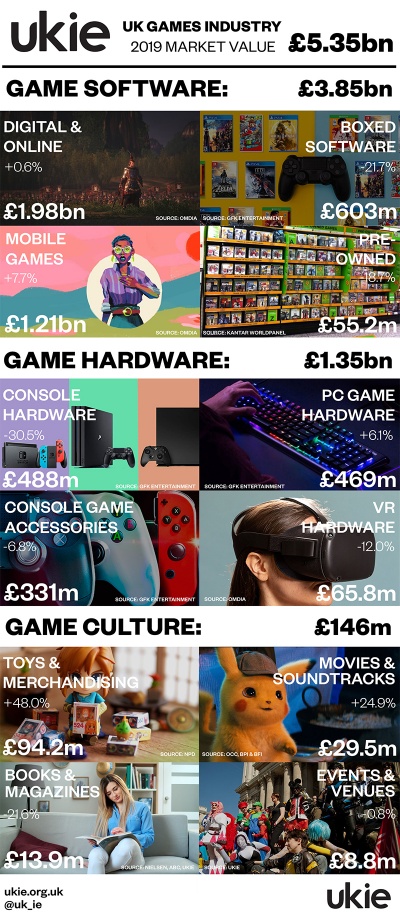Difference between revisions of "2019 UK Consumer Games Market Valuation"
(Created page with "thumb|border|400px|Ukie 2019 UK Consumer Games Market Valuation All figures shown below are those given on the date of...") |
(→Valuation Summary) |
||
| Line 125: | Line 125: | ||
|Ukie | |Ukie | ||
|8.9 | |8.9 | ||
| − | |8. | + | |8.8 |
| -0.8% | | -0.8% | ||
|- | |- | ||
Latest revision as of 13:53, 21 April 2020
All figures shown below are those given on the date of publication. Later valuations may have revised the figures for this year.
Contents
2019 Valuation
The UK market for video games between January and December 2019 was valued at £5.35bn, an overall drop of -4.8% on the previous year’s record-breaking results. This finding comes as the industry finds itself on the cusp of a new generation of console hardware and, as with previous transitional periods, consumer revenues are reflective of a market of expectant of the next big thing.
2019 proved to be a varied year for the sector, with each of the three main areas of game software, game hardware and game culture each with a different story to tell. Game software saw a pause in the growth trend of the recent years, with revenues plateauing and a small -2.1% drop to £3.85bn. Hardware saw a slower year, with a -14% decline to £1.35bn, mirroring demand for last-gen consoles. However, broader interest in games continues to grow with UK audiences, with game culture revenues climbing +28.5% to £146m.
Game Software
Within the software market, data from Omdia (previously known as IHS Markit) showed that digital and online revenues maintained their 2018 peak, with a small +0.6% year-on-year increase to £1.98bn. Digital PC and console revenues now comprise 51% of the overall UK game software market.
Mobile game revenues also saw a positive year, continuing the growth trend of recent years, up +7.7% to £1.2bn, thanks in part to the ongoing success of mature titles such as 'Candy Crush', 'Clash of Clans' and 'Roblox' continuing to lead the top-performers.
In the physical retail world, after two steady years buoyed by headline releases, data provided by GfK Entertainment showed boxed games revenues declining -21.7% to £603m. Data from Kantar Worldpanel also showed a similar story in pre-owned sales revenues, dropping 18.7% to £55.2m.
Game Hardware
The impact of the changing console cycle is perhaps clearest when looking at console hardware revenues, down -30.5% in 2019 to £488m, according to data from GfK Entertainment. GfK data also showed a related drop in console game accessories, although less dramatically at -6.8% to £331m. Separate to these however, PC game hardware enjoyed a steady +6.1% growth to £469m, again via data provided by GfK.
While overall VR hardware revenues saw a -12% decline to £65.8m in 2019, the story behind this rapidly developing sector is more complex, with new standalone VR headsets beginning to have a significant impact on the market.
Game Culture
Looking at the broader impact of games within culture, it’s clear that demand for game-related experiences and products remains in good health. Game-related toys and merchandising revenues saw their first boom year since the closure of Toys-R-Us, increasing +48% in 2019 to £94.2m, with 'Fortnite'-related toys playing a major role according to data provided by NPD.
Game-related films, video and music also enjoyed a successful year, with the smash box office returns for 'Detective Pikachu' helping drive revenues up +24.9% to a combined £29.5m, according to data from the BFI, BPI and Official Charts Company.
As with previous years, tentpole franchises like 'Pokémon' and 'Minecraft' were key to game-related book revenues, however declines in physical demand and the shift to digital’s impact on magazine revenues saw an overall drop of -21.6% in game-related books and magazines to £13.9m, combined data from Nielsen Book, ABC and Ukie's own research showed.
Finally, analysis from Ukie showed demand game-related events for 2019 remained buoyant, with headline expos like EGX and Insomnia supporting overall UK ticket revenues of £8.8m, a small drop of just -0.8% on the previous year.
Valuation Summary
The 2019 UK games market consumer spend valuation details in full are as follows:
| Categories | Data Supplier | 2018 (£m) | 2019 (£m) | % Growth |
| Digital & Online | Omdia | 1,964.7 | 1,976.9 | +0.6% |
| Boxed Software | GfK Entertainment | 770.0 | 603.0 | -21.7% |
| Mobile Games | Omdia | 1,126.4 | 1,213.3 | +7.7% |
| Pre-owned | Kantar Worldpanel | 68.0 | 55.2 | -18.7 |
| Game Software Total | 3,929.2 | 3,848.4 | -2.1% | |
| Console Hardware | GfK Entertainment | 702.0 | 488.0 | -30.5% |
| PC Game Hardware | GfK Entertainment | 442.0 | 469.0 | +6.1% |
| Console game accessories | GfK Entertainment | 355.0 | 331.0 | -6.8% |
| VR Hardware | Omdia | 74.8 | 65.8 | -12.0% |
| Game Hardware Total | 1,573.8 | 1,353.8 | -14.0% | |
| Toys & Merchandise | NPD | 63.6 | 94.2 | +48.0% |
| Books & Magazines | Nielsen Books / ABC / Ukie | 17.8 | 13.9 | -21.6% |
| Movies & Soundtracks | Official Charts Company / BFI / BPI | 23.6 | 29.5 | +24.9% |
| Events & Venues | Ukie | 8.9 | 8.8 | -0.8% |
| Game Culture Total | 114.0 | 146.5 | +28.5% | |
| UK Games Market Total | 5,616.9 | 5,348.6 | -4.8% |
